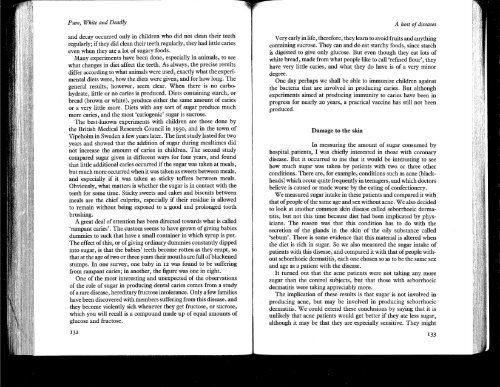John_Yudkin_-_Pure_White_and_Deadly_revised_1986_OCR
John_Yudkin_-_Pure_White_and_Deadly_revised_1986_OCR
John_Yudkin_-_Pure_White_and_Deadly_revised_1986_OCR
Create successful ePaper yourself
Turn your PDF publications into a flip-book with our unique Google optimized e-Paper software.
<strong>Pure</strong>, <strong>White</strong> <strong>and</strong> <strong>Deadly</strong><br />
<strong>and</strong> decay occurred only in children who did not clean their teeth<br />
regularly; if they did clean their teeth regularly, they had little caries<br />
even when they ate a lot of sugary foods.<br />
Many experiments have been done, especially in anim~s, to see<br />
what changes in diet affect the teeth. As always, the preclse resul~s<br />
differ according to what animals were used, exactly what the expenmental<br />
diets were, how the diets were given, <strong>and</strong> for how long. The<br />
general results, however, seem clear. When there is no carbohydrate,<br />
little or no caries is produced. Diets containing starch, .or<br />
bread (brown or white), produce either the same amount of canes<br />
or a very little more. Diets with any sort of sugar produce much<br />
more caries, <strong>and</strong> the most 'cariogenic' sugar is sucrose.<br />
The best-known experiments with children are those done by<br />
the British Medical Research Council in 1950, <strong>and</strong> in the town of<br />
Vipeholm in Sweden a few years later. The first study lasted for two<br />
years <strong>and</strong> showed that the addition of sugar during mealtimes did<br />
not increase the amount of caries in children. The second study<br />
compared sugar given in different ways for four years, <strong>and</strong> found<br />
that little additional caries occurred if the sugar was taken at meals,<br />
but much more occurred when it was taken as sweets between meals,<br />
<strong>and</strong> especially if it was taken as sticky toffees between meals.<br />
Obviously, what matters is whether the sugar is in contact with the<br />
teeth for some time. Sticky sweets <strong>and</strong> cakes <strong>and</strong> biscuits between<br />
meals are the chief culprits, especially if their residue is allowed<br />
to remain without being exposed to a good <strong>and</strong> prolonged tooth<br />
brushing.<br />
A great deal of attention has been directed towards what is called<br />
'rampant caries'. The custom seems to have grown of giving babies<br />
dummies to suck that have a small container in which syrup is put.<br />
The effect of this, or of giving ordinary dummies constantly dipped<br />
into sugar, is that the babies' teeth become rotten as they erupt, so<br />
that at the age of two or three years their mouths are full of blackened<br />
stumps. In one survey, one baby in 12 was found to be suffering<br />
from rampant caries; in another, the figure was one in eight.<br />
One of the most interesting <strong>and</strong> unexpected of the observations<br />
of the role of sugar in producing dental caries comes from a study<br />
of a rare disease, hereditary fructose intolerance. Only a few faInilies<br />
have been discovered with members suffering from this disease, <strong>and</strong><br />
they become violently sick whenever they get fructose, or sucrose,<br />
which you will recall is a compound made up of equal amounts of<br />
glucose <strong>and</strong> fructose.<br />
132<br />
A host of diseases<br />
Very early in life, therefore, they learn to avoid fruits <strong>and</strong> anything<br />
containing sucrose. They can <strong>and</strong> do eat starchy foods, since starch<br />
is digested to give only glucose. But even though they eat lots of<br />
white bread, made from what people like to call 'refined flour', they<br />
have very little caries, <strong>and</strong> what they do have is of a very minor<br />
degree.<br />
One day perhaps we shall be able to immunize children against<br />
the bacteria that are involved in producing caries. But although<br />
experiments aimed at producing immunity to caries have been in<br />
progress for nearly 20 years, a practical vaccine has still not been<br />
. produced.<br />
Damage to the skin<br />
In measuring the amount of sugar consumed by<br />
hospital patients, I was chiefly illterested in those with coronary<br />
disease. But it occurred to me that it would be interesting to see<br />
how much sugar was taken by patients with two or three other<br />
conditions. There are, for example, conditions such as acne (blackheads)<br />
which occur quite frequently in teenagers, <strong>and</strong> which doctors<br />
believe is caused or made worse by the eating of confectionery .<br />
We measured sugar intake in these patients <strong>and</strong> compared it with<br />
that of people of the same age <strong>and</strong> sex without acne . We also decided<br />
to look at another common skin disease called seborrhoeic dermatitis,<br />
but not this time because diet had been implicated by physicians.<br />
The reason was that this condition has to do with the<br />
secretion of the gl<strong>and</strong>s in the skin of the oily substance called<br />
'sebum'. There is some evidence that this material is altered when<br />
the diet is rich in sugar. So we also measured the sugar intake of<br />
patients with this disease, <strong>and</strong> compared it with that of people without<br />
seborrhoeic dermatitis, each one chosen so as to be the same sex<br />
<strong>and</strong> age as a patient with the disease.<br />
It turned out that the acne patients were not taking any more<br />
sugar than the control subjects, but that those with seborrhoeic<br />
dermatitis were taking appreciably more.<br />
The implication of these results is that sugar is not involved in<br />
producing acne, but may be involved in producing seborrhoeic<br />
dermatitis. We could extend these conclusions by saying that it is<br />
unlikely that acne patients would get better if they ate less sugar,<br />
although it may be that they are especially sensitive. They might<br />
133



